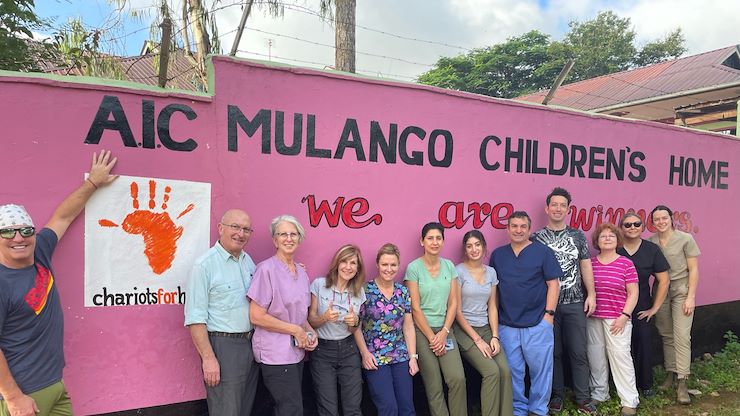
MCCC Dental Hygiene Program Assistant Professor Linda Teal Mercer and Lecturer Barbara McCormack along with two alumni were among a team of dental practitioners who went on a trip to Kenya to treat patients. Photos courtesy of Barbara McCormack.
Montgomery County Community College Dental Hygiene Program faculty members and alumni recently returned from a mission trip to Africa to help clean and protect children’s teeth.
Assistant Professor Linda Teal Mercer and Lecturer Barbara McCormack traveled to Kenya from Dec. 31-Jan. 16 on a dental mission trip, sponsored by the Blue Bell Rotary Club. During their stay, they visited three homes: Mukaa Children’s Home, Kitui Baby Home and Mulango Children’s Home. These homes are supported by the Dresher-based Chariots for Hope non-profit 501(c)3 organization, which supports orphans in Kenya. The focus was to treat all the children, young adults, caregivers and as many of the local community as possible.
“Not only are we cleaning teeth also providing oral health education,” said McCormack, who graduated from MCCC in 2005. “So they know how to care for themselves to prevent dental diseases. It’s one of the biggest afflictions of children.”
“More common than asthma,” said Mercer.
“It affects children’s and adult's ability to eat,” said McCormack, “their nutrition, speech and general wellbeing. We want them to feel good about themselves."
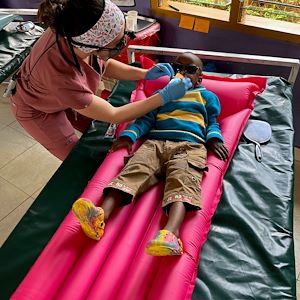 The team of 12 who went on the trip and treated a total of 434 patients in six days.
They provided fluoride applications to help prevent dental diseases from moving forward.
The team of 12 who went on the trip and treated a total of 434 patients in six days.
They provided fluoride applications to help prevent dental diseases from moving forward.
The team used a new type of fluoride for children with cavities, which stops the disease in its tracks. This protects the children from the danger of losing their teeth, they explained.
This was Mercer’s fourth time in Kenya and 13th time leading a dental mission trip abroad. It was McCormack’s second time in Kenya. Among the other Mustangs in attendance was 2019 Dental Hygiene graduate Karen Stanford and 2017 graduate Nahal Saeedi, on her second trip.
Coming back to the same group homes allowed the visitors to feel like they were making a real difference.
“It’s nice to find a community to connect with to start seeing some change,” said Mercer. "To visit and clean teeth is helpful, but to see a change, that’s what makes things worth it to increase awareness of oral health.”
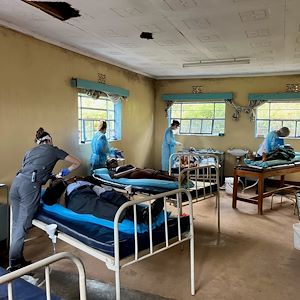 The last time they visited, Mandana Etemad, the sole dentist on the trip, performed
200 teeth extractions. “It’s the only dental care they have in four years,” said Mercer. “It would be great to do restorations but that’s not a possibility. Getting them out
of pain is the priority.” This time, thanks to the work they did to promote oral hygiene, she only had to perform
30 extractions.
The last time they visited, Mandana Etemad, the sole dentist on the trip, performed
200 teeth extractions. “It’s the only dental care they have in four years,” said Mercer. “It would be great to do restorations but that’s not a possibility. Getting them out
of pain is the priority.” This time, thanks to the work they did to promote oral hygiene, she only had to perform
30 extractions.
One of the biggest challenges each time Mercer, McCormack and their team arrive is to figure out where to set up a makeshift dental office.
“It’s an adventure,” said McCormack. “Each time we arrive in these places, you go to individual homes to see what they have available. Then we put our brains together and make it happen.”
For example, at the Mukaa Children’s Home, they set up in the dining hall. They used dining room tables for chairs and inflated pool rafts to make patients more comfortable.
“You just build makeshift workstations out of stacking chairs, and you go from there,” said McCormack. “Sometimes the lights go out. Luckily, we have headsets.”
“It’s a wing and a prayer,” said Mercer on the backbreaking work. This year seven team members had already been on a previous trip. “The only thing require is a place to do it. And we require something to sterilize the instruments. We bring the rest.”
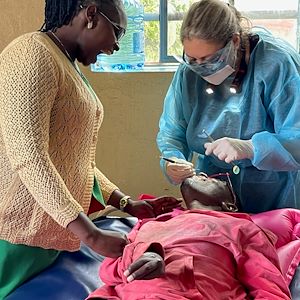 In the past, each patient received two cups. One to drink from and one to spit in.
This year McCormack and her husband brought hoses to connect to patient chairs to
collect the saliva and blood more efficiently.
In the past, each patient received two cups. One to drink from and one to spit in.
This year McCormack and her husband brought hoses to connect to patient chairs to
collect the saliva and blood more efficiently.
“Each year gets better with new ideas. We make it work,” said McCormack. “It’s the little things.”
When they aren’t working, the team members face less than ideal conditions. Accommodations are limited, for starters.
“This is my 13th trip abroad, so you learn so much every trip,” said Mercer. “When we are renting a hotel, I need to request toilet seats, curtains on the bathrooms and maybe find out the policy for when there are bugs in the bed, how will that be addressed. We’re also used to not always having water and power.”
“It’s a challenge for some people,” said McCormack.
Similarly, meals are limited in variety. Breakfast, lunch and dinner consist of spinach, potatoes and cabbage.
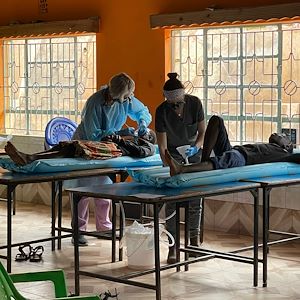
“You can’t complain because that’s what they eat every day. Spinach again. It’s a life lesson. You learn to appreciate all we have. You come home and turn the lights off and don’t leave water running.”
“The fun is all of that. If you can’t laugh through that, you don’t belong,” said Mercer. “It’s not for the timid.”
Each mission ends with an African Safari, which is a highlight for those who have gone.
“A couple days on safari is so much fun,” said Mercer.
“It’s a nice treat,” said McCormack. “The trip is very daunting. The travel, the elements and the work are grueling. But it’s great to do it together and just go with the flow.”
The other reward is interacting with the children there at each group home.
“The kids are so much fun and give so much back,” said Mercer. “We’re greeted with hugs, songs, dance -- we couldn’t feel better about the whole thing. It’s very rewarding. The fact we found this community that is very willing to work with us to make this work is a gift. We’re already talking about doing more of this.”
The team members have made lifelong friendships. In fact, several have begun sponsoring children living in the homes.
“This is not a small thing to take on,” said Mercer. “You’re signing on to be responsible for children. It’s great to see the children we sponsor and provide treatment to them.”
“It’s so heartwarming,” said McCormack.“It was a thrill when we met the children on our first trip. We were able to see them again this visit. It’s amazing to see how they’ve grown. Our sponsorship funds their education through high school.”
“It’s a wonderful thing you don’t have to do,” said Mercer, “but it’s an added way of service after we get back.”
